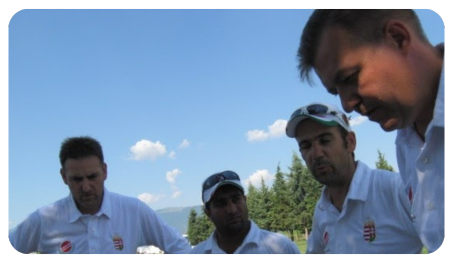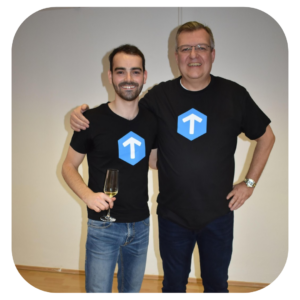Harvey John
Unit 2 Ferry Wharf
Hove Enterprise Centre
Basin Road North
Portslade, East Sussex
BN41 1BD
Time and time again, we’re asked by junior candidates what it takes to reach the senior grades within the indirect tax world. And rather than give you our answer, we thought it would be best if we shared the views of those who have been there and done it!
Mike, it’s great to have you interviewing with us to contribute to our ‘Becoming’ series. As you know, our aim here is to share the journeys and advice of current tax leaders with the tax leaders of the future. Before we get started, can you start by telling us a few words about yourself?
Sure, well I trained with a small firm, before moving after qualification as a Chartered Accountant to specialise in tax. Fourteen years into my career, I left the UK to head up Big 4 tax groups in Ukraine and Hungary. Outside work, I like to spend time with my wife, young daughter, and friends, as well as take the opportunity (when I can) to watch my hometown team, Saints, in the Super League, plus any cricket that I can squeeze in. From 2008 to 2012, I played for the Hungarian national cricket team and won annual awards for wicketkeeping. I love to spend time in Greece, especially my wife’s home island of Rhodes.
Now, together with my two business partners, I’m focused on changing the world of VAT compliance with Taxually.
So, Mike, you’ve had quite the journey since starting in the world of tax! Where does the story start for you?
I first heard of Chartered Accountancy from a Partner in a smaller firm called Whitehead & Aldrich based in Preston, Lancashire. He looked after the audit of my father’s Insurance broker and personal financial planning business. He spoke very positively about his experience as an accountant and I decided I’d like to become one. I was 13 years old. My aim from that point on was to become a Chartered Accountant as early as possible. After completing my A levels, I turned down a few university offers and joined a 9-month foundation course in Preston, before starting to work just before my 19th birthday for the same man that set me on the path 6 years earlier. I completed the Professional exams on the first attempt 3 years later.
My 4-year training contract concluded in the summer of 1988. It became obvious to me in the first couple of years that the main advice valued by the clients centred around the calculation and minimisation of taxation. We also used to travel down to London for about 3 weeks per year to undertake an audit. The combination of experiencing London and the desire to specialise in taxation led me to work with Arthur Andersen’s London office from 1988 to 1991. I moved back north for a while and joined Coopers & Lybrand as a manager in their Liverpool office, before returning to London in 1994, then as a Senior Manager with C&L.
In 1997, I approached my counselling Partner and said I would like to have the chance to manage my own department. He told me the best opportunities were at that time in Russia and the former CIS countries. And so after a visit to Kyiv at the end of 1997, I was excited to transfer there from 1 March 1998. This decision to move abroad changed my life completely, and all in a good way! I left behind my narrowly focused world and met so many intelligent, thoughtful and good-natured people from Europe, Africa, North, Central and South America, Asia and Oceania.
In June 1998, an opportunity came to head up KPMG’s tax practice in Kyiv and to become a Partner. Although it meant cutting my guaranteed route back to the UK, I decided this was a risk worth taking. So from January 2001, I transferred to KPMG’s Budapest office and remained there as a Partner until the end of 2017. During that time, as Head of Tax of KPMG’s European Compliance service centre, I oversaw growth in my department from 35 to 570 people. An incredible experience!
And now I have embarked on an exciting new adventure with Taxually. We are redefining the business of tax compliance services, starting with indirect tax. And within this, we’re focusing our efforts and considerable collective experience on making compliance as simple and intuitive as possible. Simplicity, however, is far from simple.
That’s quite a story! And to think that there aren’t many twenty-something-year-olds who know what they want to do, let alone a 13-year-old who sees through an ambition to work in accountancy! From your early days at Arthur Andersen, did you always want to become a Partner?
In professional practice, it is a major achievement to become a Partner. I never deviated from my desire to be a Partner at the earliest opportunity possible and I finally reached my goal in June 1998. It’s not really possible to understand in advance what being a Partner entails. Naturally, there’s the pride of reaching the ‘top grade’ and the positive financial implications, and these probably drove me most in those earlier years. But once that particular landmark is passed, other motivations take over, which revolved mainly in my case around building an ever-growing business and helping people succeed in their careers.
As you worked through the ranks in the Big 4 world, what goals and objectives did you set yourself that an aspiring Partner may want to hear about or take note of?
Initially, we spent time focusing on technical excellence and obtaining the accounting and tax skills to be proficient in the job. And then being a successful manager requires the ability to lead teams and assist with their personal development. Once I became a Partner and was in charge of the tax department, the focus became much more on business generation, exceeding budgets and growing the size of the business each year. This doesn’t happen by chance, of course. The most important aspect of long-term success, whether in taxation or another field, is the quality of the people in the team. In my opinion, a happy team who feels supported and has a connection with its leaders will deliver great results. This seems obvious, particularly in a people business, but my experience is that few tax leaders really understand this, or are prepared to make the personal sacrifices required.
Were you active in self-education? Are you still currently active in self-education?
Self-education is something that must take place throughout life. Every day we can, and often do, learn something new. The most important thing is to be open to learning.
We must resist the urge to believe that after a certain number of years, we have reached the top and don’t need to learn any more. Initially, education is usually focused on the technical skills required to do the job. As a career develops, emotional intelligence becomes increasingly important. It is this that sets very good leaders apart from their peers.
Most recently, the advent of technology’s importance means that it is not sufficient to be merely a good tax technician. Implementation of a focused technology approach is vital to being successful in the modern business environment. The skills required are now found in multiple disciplines and so a commitment to self-education and humility to learn from others are more important than ever.
During your time in the Big 4, you’ve also been fortunate enough to gain international experiences too. This is something I’ve always been very interested in speaking with tax professionals about, hence our other interview series The Tax Expat. How important has your time working abroad been in shaping your perspectives as a Partner and now Co-Founder today?
Moving abroad was the most important thing that I did in my life (apart from getting married and having a child!). I didn’t appreciate how insular I was until I spent some time living and working in a completely different environment. There’s a freedom to work internationally which isn’t readily available in the UK.
Moving to Ukraine was quite an adventure and my wife and I still repeat the stories of our life there to an often incredulous audience. After that major change to our lives, Hungary seemed comparatively tame, but professionally, and again personally, it was extremely positive.
From Partner to entrepreneur, you’re now a Co-Founder at Taxually. With many years of experience in the world of indirect tax – and an established Senior Partnership role at KPMG Hungary – what influenced your decision to set up Taxually?
Our leadership team (Stefan and Fergal) and I have had a significant amount of experience in indirect tax compliance. Beyond this, we’ve known and worked closely with each other since the first years of this decade. One of the most enjoyable parts of our work was that we could act as entrepreneurs whilst we built up our market-leading business in Budapest with KPMG and, as the business became more significant, it was unsurprising that it attracted increasing attention from KPMG internationally.
One of the challenges of any established organisation is to maintain an appropriate balance between oversight and freedom to exercise initiative. The current market direction for compliance (and more broadly tax advisory services) requires an organisation to be flexible, agile and able to implement decisions quickly. With our knowledge and experience, we all believe that Taxually is very well placed to benefit from the massive market opportunity. We also believe that we need to act quickly, adapting to market needs within very short timescales. And again, Taxually is very well placed to meet these requirements for success.
Mike, when we spoke last and I asked you about Taxually, you told me that you were ‘excited by the prospect of doing things differently’. What is the vision at Taxually?
Our vision is to be the best in the world in our chosen field and, in achieving that, our business depends on the three key pillars of people, processes, and technology.
In addition, it’s essential to have a customer-focused obsession and an integrated approach to design. Each of these areas has to be given its due importance. By starting with a clean slate and not being limited by pre-existing processes, technology or attitudes, we had an unparalleled opportunity to bring all of these key areas together. Our objective is to ensure seamless integration between our people, our technology platform, our key values and our ability to scale the business quickly and profitably. We have unlimited routes to market so we’re not reliant on any particular segment of the business opportunities.
In regards to ‘people’, this is surely one of the key considerations for anyone in a leadership role. In your time as a Partner and now a business owner, what is your ethos around how you manage your teams? And what key learnings have you had that you’ll take with you to Taxually?
I’ve always believed that people are the most important part of any business. My experience in over 20 years of leadership has shown me that if you treat people in the right way, they’ll respond and commercial success follows.
We spend a long time at work and our motivation for being there will only come from the people around us. This applies just as much to Partners as it does to a person in their first year. The most important thing, therefore, is that the leader creates and maintains an atmosphere where people feel safe, and respected and can thrive. It is also important, to be honest with people and to deliver on what has been promised. Credibility is built up slowly over many years. It is important to spend time with people when they need support and to know when to keep out of the way of those who revel in taking initiative. I like to believe that I have a good reputation with those I have worked with, and so I bring this as an advantage to Taxually as we rapidly scale our business.
From interviewing tax leaders, I’ve learnt that everyone has a different approach to the day. Do you have a daily routine?
I can’t say that I have a strict daily routine. I’m on top of things so get my emails dealt with early. I also like to be on time for appointments as this shows respect for others. Other than that I keep things quite flexible and I very much look to learn from others, rather than believe that they should learn from me.
What sort of habits do you think someone needs to become a tax leader? And what can one do to work towards this progression?
I don’t think that the habits of a tax leader are different from those of any other leader. All the books on leadership that I have read point towards the need to act with integrity, be available to and make a connection with others, and continually grow in emotional intelligence. Leading by example is essential. The leaders I have most respected in my career are those who have been honest with me and didn’t expect me to do what they were not prepared to do themselves. Overall, I think humility is essential for effective leadership.
Do you have any career inspirations or professionals that you look up to?
The people I looked up to during my career are all long retired now. My father was an inspiration for his work ethic and efficiency. When I saw him work, he hardly wasted a minute. I have, however, learnt a lot from many bosses about how not to lead. The influencers who have most impacted my thinking in the past few years are Simon Sinek and Jim Collins. Other than these, I am learning a great deal from my partners, Stefan and Fergal, and the rest of the Taxually team.
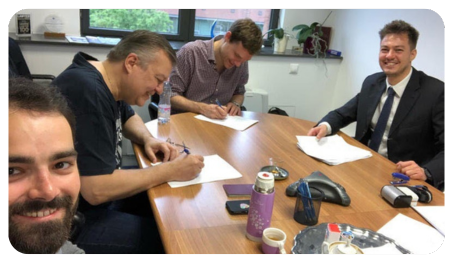
Eventually, we’d love to create a reading list of books (fiction or non-fiction) suggested by tax leaders. What books would you recommend to a budding tax professional?
The books I have most enjoyed over the past few years are:
- Thinking, Fast and Slow – Daniel Kahneman
- Mindset – Carol Dweck
- Zero to One: Notes on Startups, or How to Build The Future – Peter Thiel with Blake Masters
- The Hard Thing About Hard Things – Ben Horowitz
- Good to Great – Jim Collins
- Great by Choice – Jim Collins
- Start with Why – Simon Sinek
- Leaders Eat Last – Simon Sinek
I also like to read any book by G.K. Chesterton, C.S. Lewis, and P.G. Wodehouse!
Mike, thank you so much for sharing your advice and experiences! We look forward to following Taxually’s success. How can people reach out to you guys if they’re interested in your services?
The first place to visit is our website www.taxually.com – this provides an introduction to our company, but I would encourage anyone interested in our services to request a demo of our technology. It has never failed to impress and gets better every week!
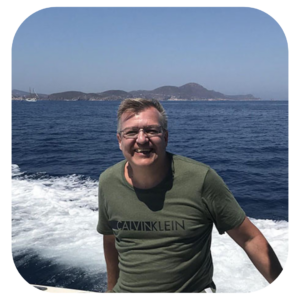
Are you at the senior level within Indirect Tax? If so, we’d love to hear about your experiences and share them with our global tax network. For more information, contact Alex.
Alex Mann is a Director in the Tax Division at Harvey John.
Search our latest tax jobs here.
If you would like to see our company updates and industry insights, follow our LinkedIn page here.
Author
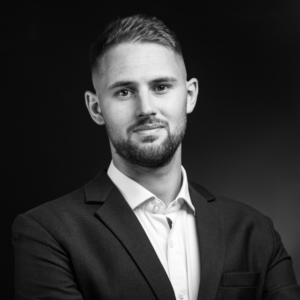
From boutiques to the Big 4, and start-ups to multinational corporations, Alex manages a diverse portfolio of clients worldwide which has enabled him to develop a vast global network of indirect tax and tax technology professionals in 40+ countries.

